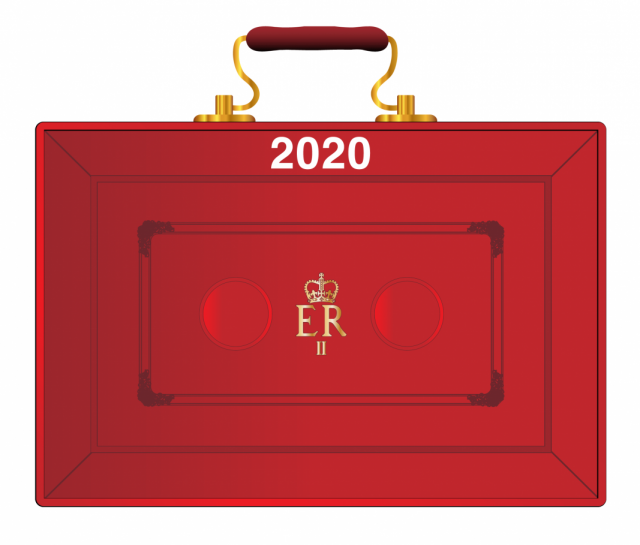This week, newly-installed chancellor of the exchequer Rishi Sunak confirmed that the UK Budget will be delivered on March 11 as planned, in a cutesy tweet showing him hard at work behind his new desk at HM Treasury.
The announcement put to bed a week of speculation that the fiscal set piece may be delayed, following the surprise departure of his predecessor Sajid Javid one week earlier, who declared that “no self-respecting minister” could accept Downing Street’s demands for him to merge their teams of advisers, and sack all of his existing team.
Now the budding new chancellor, a key ally of Boris Johnson, is set to deliver the most important fiscal policy announcement of the year – just under four weeks after taking up his position.
Curiously, there was no Budget in 2019, due to the general election causing it to be delayed from the autumn to the spring of 2020. The Budget announces the main provisions of the Finance Bill of each year, which must be enacted annually to allow for the government to collect income tax. However, whist there was no Budget in the 2019 calendar year, the March date means that it will be delivered just in time for the end of the financial year, which runs from April to April.
But what can contractors expect from the Budget? We take a look at some of the rumoured policy changes and examine how likely it is that they will be included in this year’s Budget, and what they may mean for the freelance community.
Off-Payroll extension to the private sector
The Off-Payroll rules, which will reform the way that IR35 is applied, have been subject to substantial criticism. Many professional bodies, industry groups and even some MPs have lobbied for the extension of the rules into the private sector this April to be postponed for at least another year. The verdict on their effectiveness in the public sector, where they have been in force for nearly two year, has been mixed at best.
The changes to IR35 will mean that end-clients become responsible for assessing their contractors IR35 status, and “fee-payers” (usually agencies) will become responsible for deducting PAYE taxes at source in the case of IR35-caught contractors.
A review of the controversial reforms was promised by Sajid Javid during the run up to the December general election, but only after the main opposition parties all promised either to review or scrap the policy. That review was launched in January, but was dialled-back to be merely a review of the “implementation” of the reforms, following the Conservatives’ landslide victory in the election.
The outcome of the Treasury’s review into the new rules is still forthcoming, however many commentators now believe – at this late stage – that the reforms are an inevitability. A slight tweak to the implementation date of the rules earlier in the month seemed to tacitly confirm this.
Likelihood: 9/10
End to Fuel Duty freeze
In a bid to signal the government’s determination to tackle carbon emissions, many rumours have surfaced that the Treasury may use this year’s Budget to end a freeze of Fuel Duty introduced by George Osborne back in 2010 – Fuel Duty has not risen in the nine years since, representing a decrease in the levy in real terms.
Proponents of Fuel Duty argue that the tax promotes uptake of electronic vehicles, which are widely heralded as more environmentally-friendly than their petroleum-guzzling forefathers. Opponents of the tax argue that higher fuel costs increase the cost of nearly everything, from broccoli to brogues, due to the associated rise in cost of logistics. Higher fuel prices would also disproportionately affect the working-class voters who made the Tory landslide possible.
UK Fuel Duty remains higher than that of Germany, France or the United States.
The Tories are divided on the issue, and backbenchers have been making noises in recent days about the potential of a rebellion, citing promises made by Mr Johnson during the election that he had “no intention” to raise the levy.
A Treasury source indicated to The Times this week that a fuel duty was unlikely to be included in Mr Sunak’s first budget on March 11.
Likelihood: 5/10

Entrepreneur’s Relief
Entrepreneur’s Relief allows company owners to wind up or sell their business and extract the respective capital gain at a reduced rate of 10%, up to a lifetime allowance of £10 million.
The tax break was introduced in 2008 by Gordon Brown’s Labour government to encourage entrepreneurship and investment, and the allowance was subsequently raised three times, being increased to its current level in George Osborne’s 2011 Budget.
It has since come under fire for being “expensive, regressive and ineffective” and only benefiting the rich, with Sajid Javid being rumoured to curb the tax break in his forthcoming Budget back in January.
However, since those rumours surfaced, business groups have argued that many companies have built their businesses strategies around the relief, and to suddenly scale it back would be unfair. Mr Javid has also since left his post. The tax break is estimated to cost the Treasury around £2.4 billion a year.
The relief is of increasing relevance to contractors, many of whom many be forced to close their limited companies should the impending Off-Payroll regulations force them into umbrella companies. The relief allows for a highly-tax efficient way of extracting remaining funds out of a company that is being wound-up.
Likelihood 3/10
Pension Tax Relief: cut for higher rate earners
Another widely mooted provision that may be contained in Mr Sunak’s first Budget is the removal of pension tax relief for higher rate and additional rate taxpayers, as part of the government’s commitment to “level up” the economy (whatever that means).
Under the current regime, all taxpayers are entitled to full tax relief on any pension contributions that they make: the logic being that payments made from your pension pot when you retire will be subject to tax as they are paid to you, so the relief avoids double taxation. Pension contributions are limited to an annual and lifetime allowance, but currently, additional rate taxpayers get the full forty-five per cent tax relief on pension contributions that they make, subject to said allowances.
That may be set to change. The current lifetime allowance of £1 million is arguably quite generous, and with pensions increasingly seen as a way for the better off to pave “a God-given route to grey gold”, scrapping pension tax relief for higher rate taxpayers could represent a neat way of limiting the amount that is worthwhile investing in a pension. Everyone would receive twenty per cent tax relief, and anybody wishing to contribute more than income taxed at basic rate would be free to do so, in the knowledge that it will be taxed twice.
Such a reduction in the relief could raise up to £10 billion per year.
The decision really hinges on the government’s decision to stick with electoral pledges to balance day-to-day spending by 2023 whilst not raising income tax, in which case measures like taxing pension contributions seem the only viable way to raise the money the exchequer needs to fund its public spending, or to throw the current fiscal rulebook out of the window and go on a borrowing splurge, in view of interest rates looking likely to stay low in the short- to medium-term.
Likelihood: 7/10
“Mansion tax”
Labour floated the idea of a “mansion tax” in 2014, the logic behind it being fairly straightforward: everyone in the UK who works pays income tax. But what about those who are so fortuitously wealthy that they don’t need to work? They still pay indirect taxes, such as VAT and duties, but their contribution to society is limited by their reduced exposure to income tax and National Insurance: by far the biggest sources of revenue to the government.
The solution? A tax on their assets – specifically, on residences worth over £2 million. The idea was derided at the time by Boris Johnson, who as then-mayor of London, called it a “tax on London”. Similarly, in 2012, the Tories objected to a mansion levy proposed by their coalition partners the Liberal Democrats, saying it “would not happen on our watch”.
However, in recent weeks the idea of a mansion tax has resurfaced, understood to be the brainchild of Dominic Cummings, one of Mr Johnson’s chief advisers. The idea could play well into the Tories newfound constituency of working-class, “left behind” voters, but would clearly upset their long-standing followers, as a party that has long been associated with wealth creation.
Sajid Javid was said to be wavering on the plans, and, following his departure, the prime minister himself was said to have “cooled” on the idea.
Recently, government sources have suggested that the mansion tax may be replaced in the Budget by changes to inheritance tax. By opening up inheritance tax, more of the ultra-wealthy’s assets could fall into the tax net, however typically these assets are well shielded behind complex webs of trusts and offshore entities.
Likelihood 2/10
21st February 2020.









